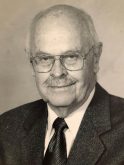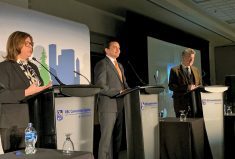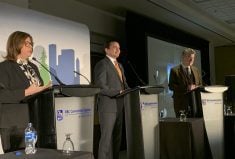Manitoba’s budget for recruiting foreign doctors would be better spent providing medical training to people from rural and remote communities, a Brandon physican who is proposing a 25-seat medical school for Brandon University says.
Dr. Derry Decter gained more support for the idea at a meeting of southwestern municipal leaders last week.
They gave him virtually unanimous support at the Association of Manitoba Municipalities’ Western District – the largest of AMM’s annual June meetings here June 17 – where Decter presented the same idea he’s taken to community groups throughout rural Manitoba in recent months: the best way to attract and retain doctors and stem this province’s chronic rural doctor shortage is is to “grow our own docs.”
Read Also

Mazergroup’s Bob Mazer dies
Mazergroup’s Bob Mazer, who helped grow his family’s company into a string of farm equipment dealerships and the main dealer for New Holland machinery in Saskatchewan and Manitoba, died July 6 from cancer.
Leaders voted in almost unanimous support of a resolution backing Decter’s vision for rural satellite medical school at Brandon University. Many agreed that the problem of rural doctor shortages is rooted in medical schools’ selection practices. Namely, they are not selecting enough students are from rural and remote communities. Nor does the system direct graduates where they’re most needed.
Manitoba currently lacks about 170 doctor positions, and neither financial incentives to lure doctors to rural areas nor the approximately $2 to $3 million spent every year recruiting foreign doctors to fill these positions is working, Decter said.
“I think we can run a medical school for approximately the kind of dollars we’re currently spending and wasting on recruitment,” said Decter. “The government is doing what it can to solve this problem, but the key piece that we’re missing is a rural school. ”
Additionally, he says, the problem is exacerbated by what he calls the “option of practising in rural areas.”
The Winnipeg-born graduate of the University of Manitoba chose that option but he was a rarity in his late 1970s class of 100 graduates. Just two ended up actually practicing in a rural area.
Thirty years later, not much has changed, and the urban-focus of medical school training is as strong as ever. “Currently in Winnipeg the selection process keys on things that are helpful to Winnipeg but in fact do very little for the country,” Decter said.
The vast majority of medical students studying medicine at University of Manitoba are urban-raised, and educated at private schools such as Balmoral Hall or St. John’s Ravenscourt. Students of these backgrounds don’t tend to pursue careers in communities like Killarney or Deloraine.
URBAN-FOCUSED TRAINING
Moreover, they end up working where they’ve trained, and when the school is urban, that’s where new doctors want to go.
“You end up with students who are comfortable working in big cities, and don’t want to come to rural areas.”
Nor is the problem fixed by spending approximately $25,000 per year on average to recruit a foreign doctor whose average stay in a rural practice is two years.
Turnover rates aside, it’s simply wrong that we now rely on countries where child mortality rates and disease rates are already eight and 10 times of ours, Decter said. “We’re one of the richest countries in the world… and we’re now effectively relying on Third World countries to supply us with doctors,” he said. “I think that’s wrong.”
FIVE-YEAR AGREEMENTS
The medical school he proposes for Brandon would not only require that every one of the 25 students possess backgrounds that are likely to make them comfortable with the life of rural and remote communities, but would be required to sign irrevocable five-year return-of-service agreements. That would destine every graduate every year to service where the need is greatest. Decter estimates it would take less than a decade to reduce the shortage.
“Over a period of about seven years you’d end up with a steady state of 170 locally trained doctors, and not only locally trained, but locally plugged into the system.”
There are enough medical practitioners in Brandon expressing interest in teaching in a medical school that such a facility could be staffed, Decter said. Upgrades to the Brandon Regional Health Centre provide a good facility for this.
Decter urged Western leaders to start talking about this idea among constituents. The push will ultimately need to come from the public, he said.
Maxine Chacun, a councillor for the Town of Virden and the Western District’s urban director, said she would urge all rural Manitobans to start thinking about this. Health services and the future of rural communities are fundamentally linked, Chacun said.
“It’s not just about being short a doctor, ” she said. “If we don’t have doctors or physicians… if we don’t have our ER open and don’t have nurses and all the other support staff… you can get people people retiring to our smaller communities. People will not move there.”



















